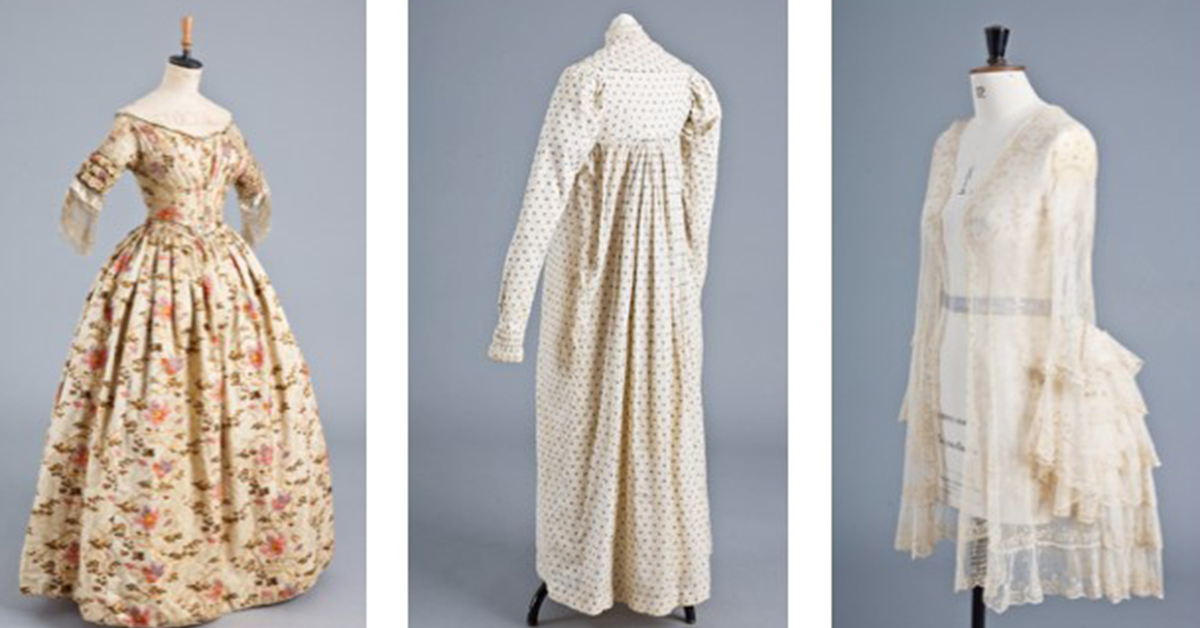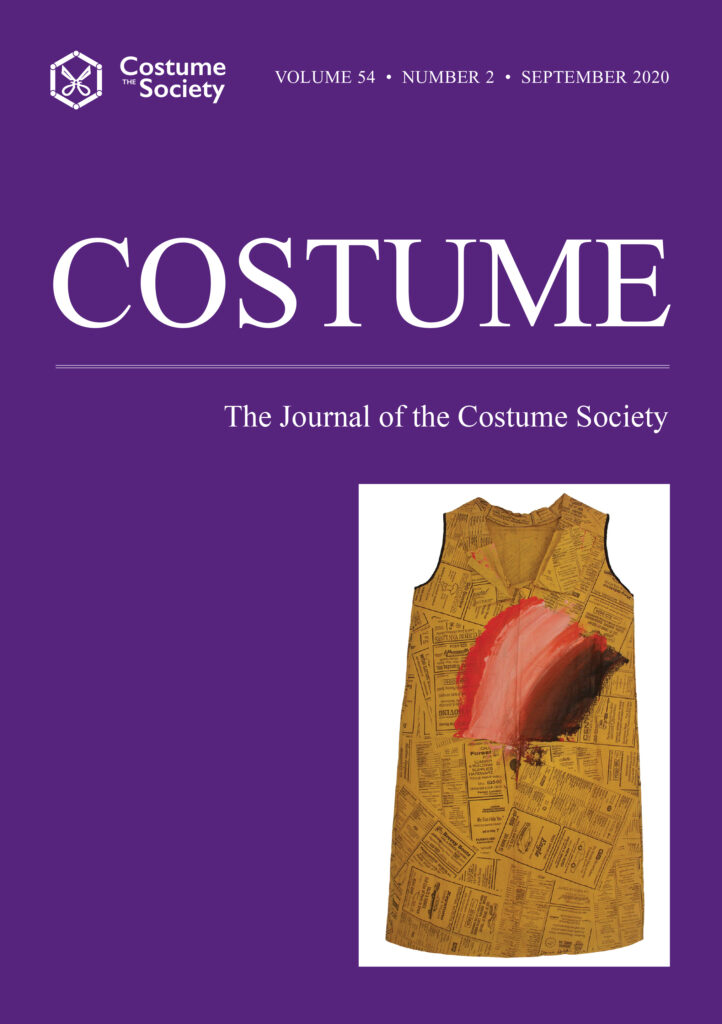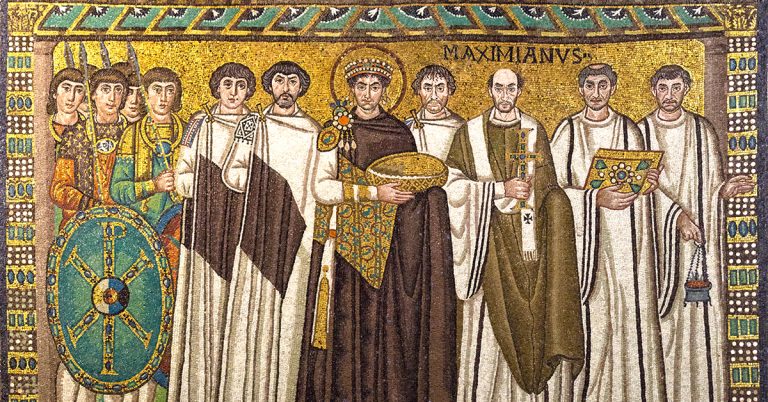
By Louise Chapman
In 2012, I uncovered an array of boxes containing 177 items of dress in the School of Fashion and Textiles archives at Birmingham City University (BCU). Found in a store cupboard the assemblage included a large selection of dress with connections to the Bunce family in Birmingham. (figs.1 &2) Recognising the objects as significant was made possible due to a previous practice of object-based study in my professional practice as a costumer for theatre, and the embedding of object-based study to inform cut, construction, and dress history in my undergraduate degree.
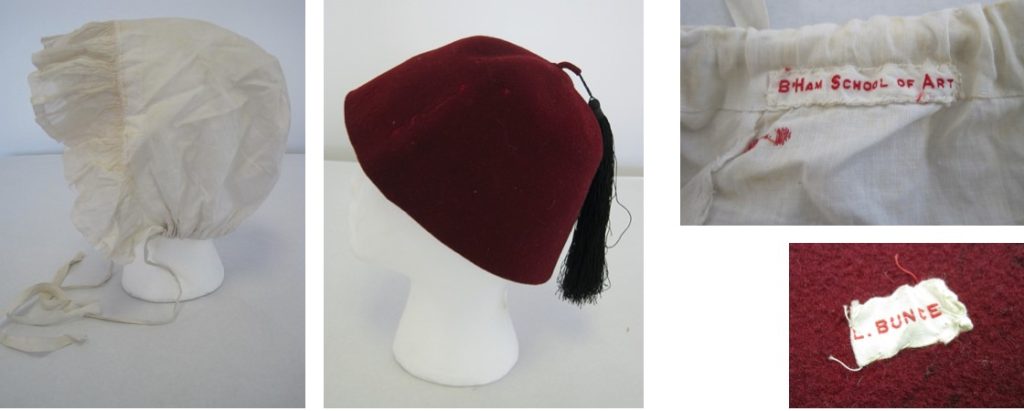
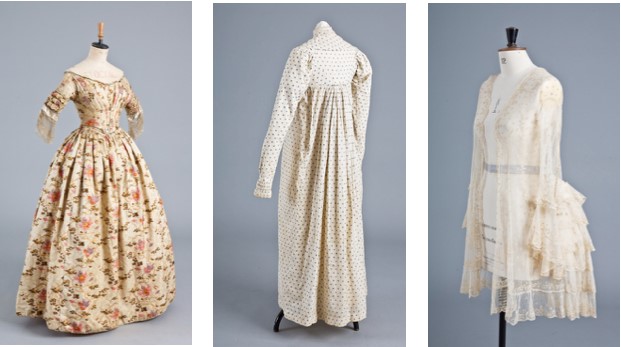
Working closely with the Art, Design and Media Archive1 at BCU (figs.3 & 4) as part of research undertaken on my MA in the History of Art and Design, enabled provenance to be uncovered thanks to the keen eye of Fiona Waterhouse, the archivist. The objects, dating from c1775-c1900 were bequeathed in 1927 by Kate Elizabeth Bunce (the late Birmingham based Pre-Raphaelite artist) to the Birmingham School of Art after her death December of that year. The Historic Dress Collection is now stored and accessible in the Art, Design and Media Archive Archive for research and study as of March 2020.
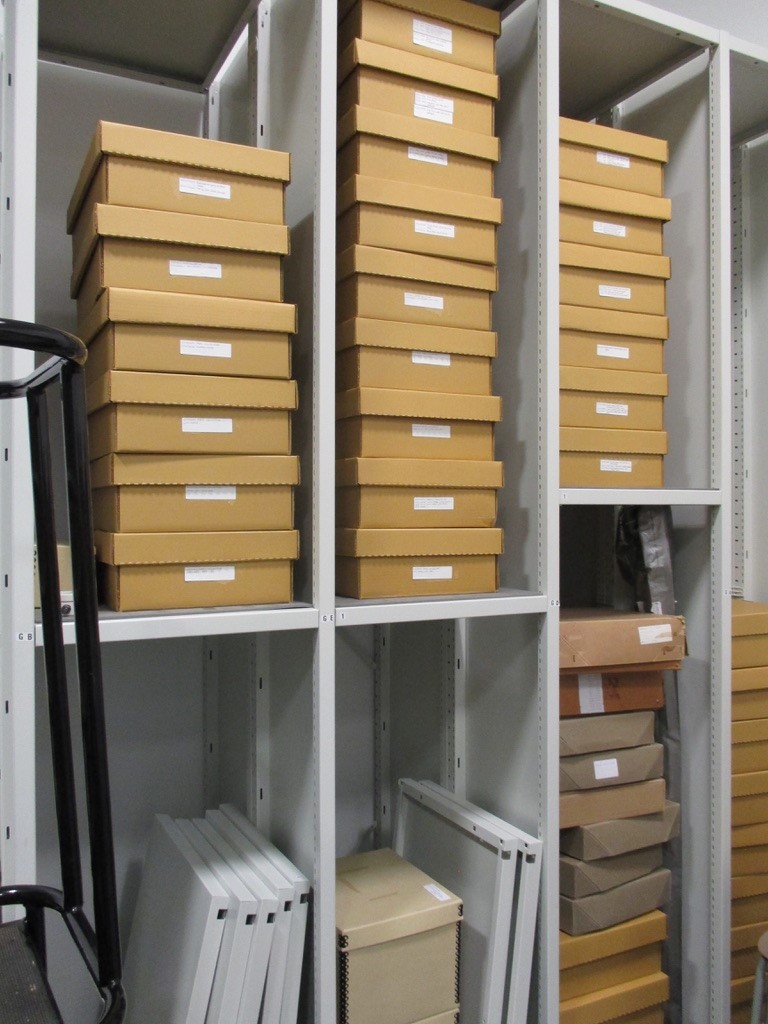
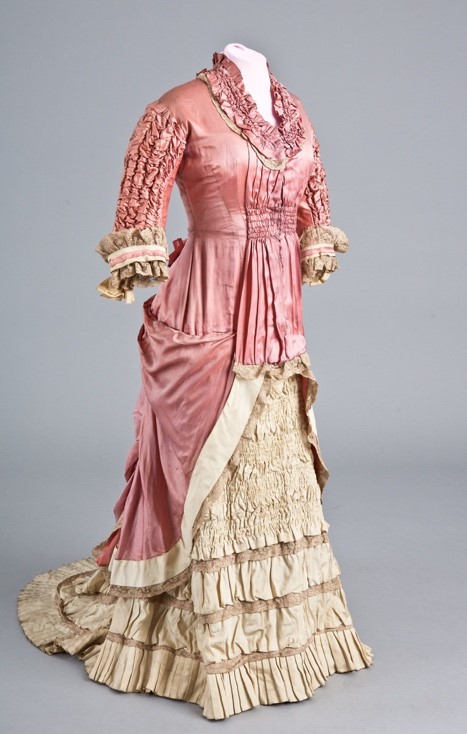
The School of Art in Birmingham2 was the first established municipal art school in the United Kingdom. Established in 1843 it quickly became an important centre for Art and Crafts education due to the vision of headmaster Edward R Taylor. (1838- 1911) Ongoing research within the archive evidenced a practice of object-based study, and drawing from historical artefacts within the School of Art. This was further supported by evidence of a museum having existed within the School of Art building on Margaret Street in building plans of the Programme for Session of 1898-99, remaining in existence until at least 1908-09.
A Catalyst for Research
Finding the assemblage of dress in 2012, and recognising its precarious position, and the immediate risk of the object’s disposal prior to the move to a new building was the stimulus for the research project. Evolving ultimately into the development of a practice- based PhD proposal now being undertaken at London College of Fashion with Professor Amy de la Haye3 as my director of studies. My research is concerned with how everyday dress might communicate stories to the spectator of dress, within encounters of dress, through costume practices. Further details on my website.4
Utilising the practice of object- based study and archives has shaped the methodologies within my Ph.D. (fig.5) Exploring the objects as performative devices within my confirmation5, (the half way point of my Ph.D.) reiterated the centrality of objects to my practice, research and teaching. Emphasising the significance of object- based study for contemporary students of costume studies my recent publication, ‘Cabinets of Costume: Renegotiating Participation Through Practice, Object-Based Study and ‘Ghosts’ of an Assemblage of Dress’6 I discussed the object as a creative catalyst for practice within the exhibition Cabinets of Costume7 (2017) co- curated with Zoe Robertson8.
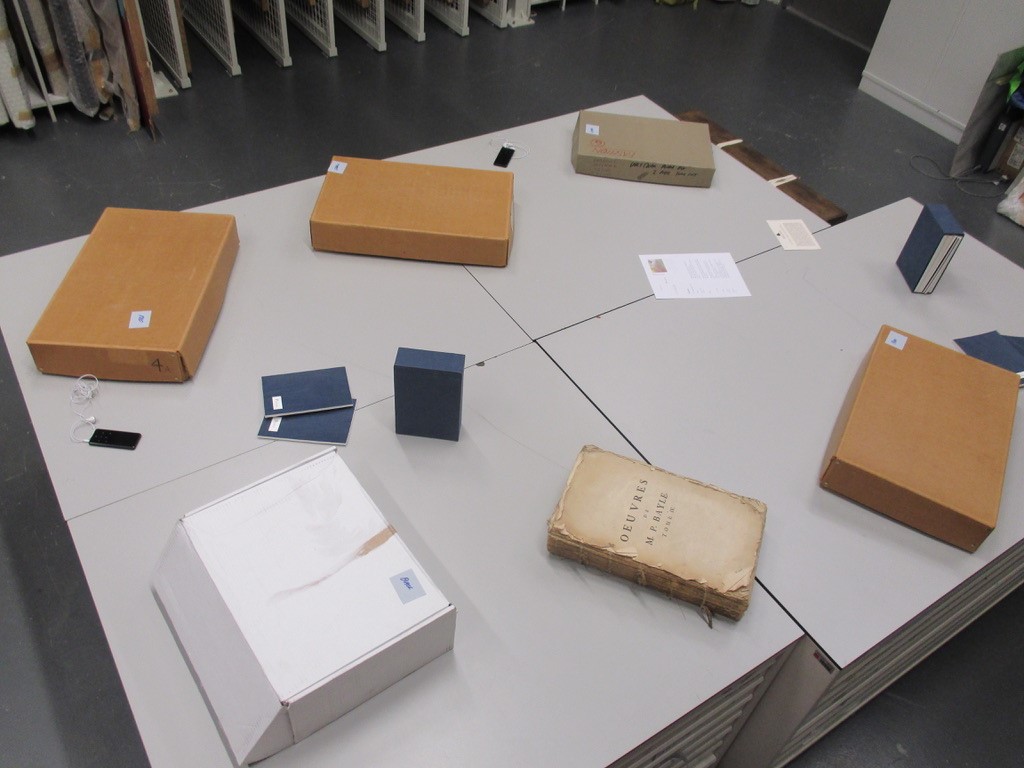
A Catalyst for Practice
The practice of object-based study to inform costume practices has been long- established as a device within dress and costume studies, with researchers including, Norah Waugh9, Janet Arnold10 and Jenny Tiramani at The School for Historical Dress11. Recently, there appears to have been a resurgence in interest in the significance of object-based study in research and teaching including, Ingrid Mida12 and Alexandra Kim’s13 book The Dress Detective14, Helen Chatterjee15, & Leonie Hannan’s16 text Engaging the Senses: Object-Based Learning in Higher Education17 (2016) and journal articles including Harriet Davidson’s paper Reconstructing Jane Austen’s Silk Pelisse 1812-181418. All reiterate the importance of object- based study as a methodological approach to research and practice. (Fig.6)
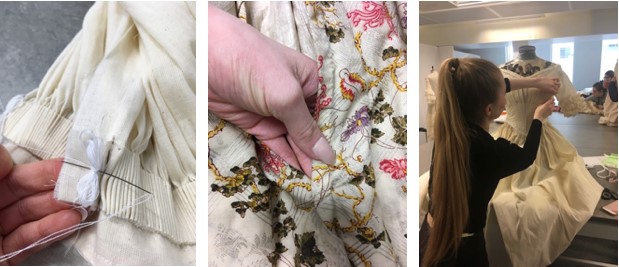
The numerous university archives across the United Kingdom is indicative of a pedagogical philosophy within university’s that values the practices of object- based study. Previously, these have been underused and neglected as a resource, or worse yet, disposed of or lost. In some small way I am trying to highlight the university art and design archive as a relevant and dynamic resource for research and creativity. Below, I have attached a list of ten university art and design archives with dress, textile, and performance specific collections. I hope that these will inspire you and maybe act as a stimulus for your research and creativity:
Top Ten University Art and Design Archives
- Art, Design and Media Archives, Birmingham City University
- Dress History Teaching Collection, University of Brighton
- CSM Collection and Archives, University of the Arts London
- Nottingham Trent University Lace Archive
- The Yorkshire Fashion Archive, University of Leeds
- Goldsmiths Textile Collection and Constance Howard Gallery, Goldsmiths, University of London
- The National Resource for Dance, University of Surrey
- Special Collections, Fashion, Middlesex University
- Archives and Special Collections, Kingston University
- The Theatre Collection, Bristol University
List of Links
- https://www.bcu.ac.uk/arts-design-and-media/art-and-design-archive/collections/school-of-art-archive
- https://www.bcu.ac.uk/art/about-us/our-history#:~:text=The%20School%20of%20Art%20has,liaising%20closely%20with%20local%20industries
- https://www.arts.ac.uk/research/ual-staff-researchers/amy-de-la-haye
- https://lchapman070161.wixsite.com/website
- https://www.youtube.com/watch?v=6Fm54AiSk_c
- https://doi.org/10.3366/cost.2020.0165
- https://www.bcu.ac.uk/fashion-and-textiles/news-and-events/schools-co-host-prestigious-international-costume-conference
- https://zoerobertson.co.uk/about/
- http://collections.arts.ac.uk/people/392/norah-waugh
- http://theschoolofhistoricaldress.org.uk/?page_id=124
- http://theschoolofhistoricaldress.org.uk/?page_id=295
- https://www.ingridmida.com/
- http://musingsmmst.blogspot.com/2014/02/curator-profile-enchanting-interview.html
- https://www.bloomsbury.com/uk/the-dress-detective-9781472580535/
- https://www.ucl.ac.uk/basc/people/prof-helen-chatterjee
- https://pure.qub.ac.uk/en/persons/leonie-hannan
- https://www.routledge.com/Engaging-the-Senses-Object-Based-Learning-in-Higher-Education/Chatterjee-Hannan/p/book/9780815399575
- https://www.euppublishing.com/doi/10.1179/0590887615Z.00000000076
Louise is studying towards a practice-based Ph.D. at London College of Fashion, entitled Costuming as an Authorial Practice: Reading and Re-Authoring an Assemblage of Every day, Aesthetic Womenswear from the Birmingham School of Art 1795-1885. Her Ph.D. is informed by her professional practice and teaching in costume utilising costuming to re-author historical dress.
Read Louise’s full article in Volume 54, Issue 2 of Costume: ‘Cabinets of Costume: Renegotiating Participation Through Practice, Object-Based Study and ‘Ghosts’ of an Assemblage of Dress‘.
Costume is the journal of The Costume Society, presenting current research into historic and contemporary dress. The journal publishes articles from a broad chronological period and with a worldwide remit, maintaining a balance between practice and theory with a focus on the social significance of dress. Read more articles, find out how to subscribe or recommend to your library.


